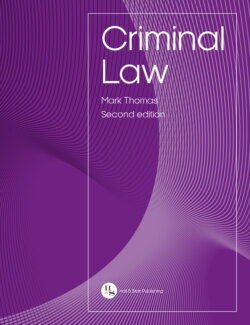Читать книгу Criminal Law - Mark Thomas - Страница 117
На сайте Литреса книга снята с продажи.
Omissions and intervening acts
ОглавлениеThe final point worthy of consideration here is whether an omission of a third party, as opposed to a positive act, can break the chain of causation. Herring, Criminal Law: Text, Cases, and Materials, 9th edn (OUP, 2020) suggests not and explains:
If the defendant stabbed the victim, who was taken to hospital but died because no medical treatment was offered, then the defendant would be said to have caused the death.
Indeed, this view has particular merit on account that the defendant in this situation would still be considered the substantial and operating cause of the end result. It is debatable how far this view can go, however. Suppose Jack pushes Jill into deep water knowing that she cannot swim. Bob is the acting lifeguard on that day, notices Jill struggling and ignores her. Jill drowns. In this circumstance, can it be said that Jack will remain the cause of Jill’s death (given that he pushed her into the pool), or will Bob have broken the chain of causation given that he had a duty to act (a contractual duty as a lifeguard) and failed to do so? This is especially pertinent if Jack knew that Bob was on duty: is it appropriate to make Jack liable in these circumstances? Ultimately, this would be a question of fact for the jury, but it is worthwhile to note that an omission may be capable of breaking the chain of causation, in the eyes of a jury, in certain circumstances.
